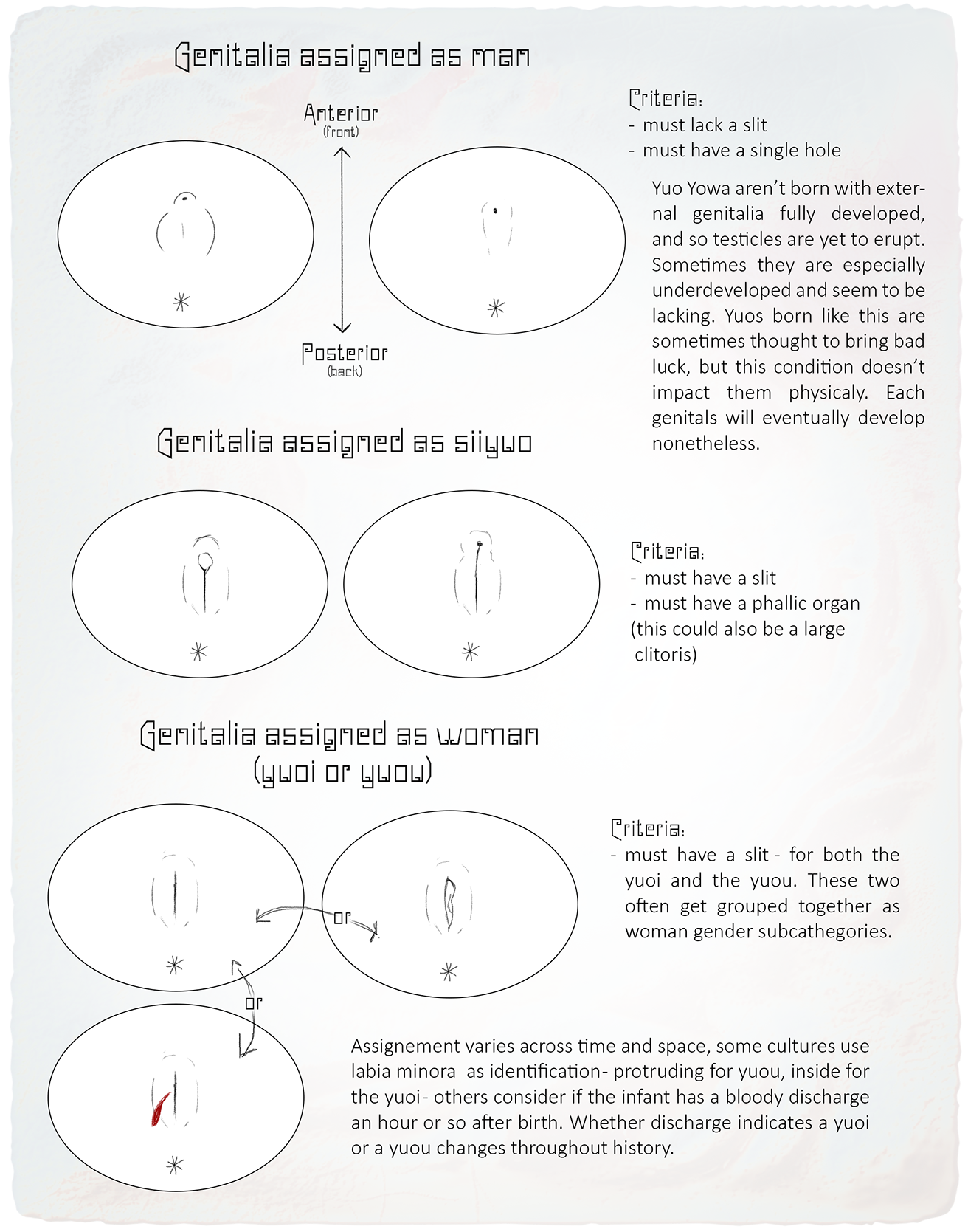Gutcure (placeholder name)
Overview
This is a set of cultures and subcultures originating in the stone-age-like societies found in the [african] savannahs. Aspects of these cultures have survived for thousands of years. It has originated in the Yuo Yowa species. This society has developed from matrilinial tribes (where possessions and status are passed down from mother to daughter) where most women and siiwe stay in one tribe and rarely travel, and men leave early on in their lives in search for new tribes and rarely settle down. This has lead to this culture to be female dominated and such structure also caused women to be the ones to develop writing, animal farming and therefore for thousands of years, the great majority of people who recorded history, and therefore decided on what yuos should learn about and from, the ones who had an upper hand in forming the society, were women. This has lead to eras of male sexism of various forms and degrees.
Religion
Organs - both internal and external - are thought to be the extensions of gods, spirits, and other sacred or great mythological figures. Each organ is thought to bring unique blessings if prepared correctly by the spiritual leader and eaten by whoever is the blessing directed towards. In early historic and late prehistoric era, organs were often dried and used as talismans, or used as a mold for various metals to turn them into holy jewelery.
Core beliefs
Hunting is an important part of their lives, even in the industrialized era where animal farming is the norm. + predator/prey relationship (prey is hunted, but highly respected) + seeing blood is good (hunt, killing prey) + bleeding is a sign of strength (resistance against the predator, experience, toughness, pain resistance, bravery) + sex is good and openly discussed
The symbolic meaning of organs
Each organ has a different meaning and a 'diety' associated with it. They sometimes vary by animals or sophonts they're taken from. Some common organs and their meanings are listed here:
- Intestines - fast and safe travels
- Womb - ascendance
- Teeth/tooth - time, aging
- Penis - fertility
- Clitoris - communication
- Placenta - Strength, extreme luck, positive challange when the child is born healthy, doom and very bad luck when the child is stillborn. Placenta from a healthy child is ritually cooked and served to the mother to regain strength, placenta from a stillborn child needs to be ritually disposed of by the spiritual leader.
Views on gender
This culture recognizes three genders, one of which has a subcategory: the man, the siiwe and two woman subtypes, the huntress and the caretaker. Gender is determined at birth based on genitals and in girls, their discharge. Yuos deemed girls by their family are born with a vulva, boys with a penis and the very rare siiwe with indeterminate genitals. Due to the mother’s hormones, it sometimes happens that newborn girls experience a menstrual-like discharge. When a girl is born, the celebrations surrounding her birth require her to wear a diaper unique to this tradition that is checked each time it’s changed and if the bloody discharge occurs within a few days, she is assigned the huntress gender. If not, she is assigned the caretaker gender.

Caretakers are raised to be assertive, witty, emotionally intelligent and responsible. Huntresses are also raised to be rather dominant, but with the emphasis on cold logic, tactics and intuition. They are encouraged to smile less. Boys are raised towards obedience and are taught survival skills and pushed to take good care of their looks.
In tribes, boys would leave their birth place after reaching what is locally considered an adulthood. They would leave together with their brothers and father and/or uncles to seek out a different tribe for better mating opportunities. Surviving in the hot savannah is harsh, and the boys’ survival is often dependent on the tribes they join and stay in, which only reinforces the emotional power of the women who are in charge of those tribes, and often causes the men to develop learned helplessness.
Cultural explanation of menstruation
Yuo Yowa are the only sophonts in this world who experience bleeding during menstruation, just like us humans. The menstrual cycle is explained as a constant battle between the predator and the prey spirits inside the menstruating person’s body. The predator periodically catches the prey or the prey kills the predator in defense (bleeding), until one of them rises from the dead and the cycle repeats. Since the spirits are a part of the person’s body, they share stimuli, like the pain. The more painful one’s cycle is, the more fierce this battle is thought to be, while painless cycles are associated with quick kills. There were teas and herbs that help with the pain, however some menstruating Yuos like to meditate instead, as the predator/prey relationship in general is seen as holy and they don’t want to disturb the battle. When sperm arrives into the uterus, it feeds the spirits, making them calm and comfortable, to the point of them mating with each other instead of fighting. When the predator is on top during mating, the child will be a girl. If the prey is on top, the child will be a boy. If they both lay down, the child will be a siiwe. If they switch the position, at least two children of different sex will be born.
Art
Cuisine